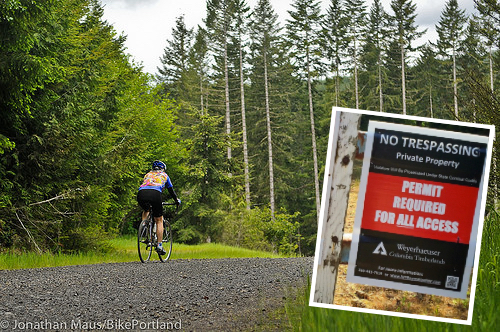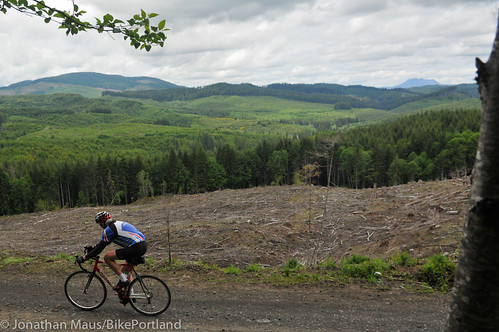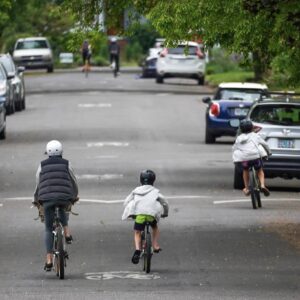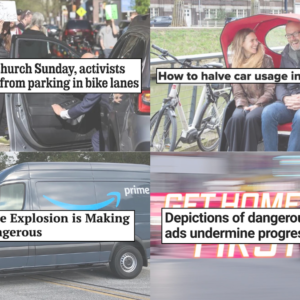
(Photo © J. Maus/BikePortland)
Several weeks ago a group of bicycle riders ran into a security guard while riding dirt roads outside of Vernonia. The incident shows that Weyerhaeuser Columbia Timberlands is actively enforcing the new permit program they launched back in July. It has also set off an effort by Columbia County Parks to create new signage that clarifies which roads the public is still free to use without a permit.
“The situation is a bit chaotic given that there is a co-mingling of public right-of-ways with private right-of-ways and these gravel roadways all look pretty much the same.”
— Glen Crinklaw, Columbia County Parks
On October 3rd, Dan Morgan and friends were riding tandems and had just set out on the Burn Road Loop from the Vernonia side. We shared a ride report and photos from that loop last spring after being guided through it by the head of Columbia County Parks (and co-owner of the nearby Coastal Mountain Sporthaus) Glen Crinklaw.
Morgan’s group was stopped by Fred Oviatt, a security contractor who works for Weyerhaeuser. In an email about the incident, Morgan said Oviatt was very accommodating and helped them map out a fun route to return to their starting point. Morgan, a veteran gravel road rider who happens to be one of the region’s foremost experts on gravel road routes, was invited to meet with Oviatt to learn more about which roads are owned by Weyerhaeuser and which are still open to the public.
After hearing about Morgan’s experience, Travel Oregon removed the Burn Road Loop from their Ride Oregon Ride website.
Advertisement
Oviatt was enforcing a new permit plan that went into effect on July 1st. As we reported at the time, the plan impacts numerous gravel roads between Scappoose and Vernonia — roads that have become increasingly popular for cycling on in recent years.
In an attempt to more closely control who is on their land, Weyerhaeuser made 100 non-motorized access permits available. They quickly sold out (mostly to hunters). To our knowledge, Morgan’s group is the first to be approached and turned back for not having a permit.
One of the issues at play here is that these areas have been commercially logged for decades. As a result dirt roads criss-cross in every direction and there’s often no signage at all. Adding to the confusion is that different logging companies have different ways of managing their lands.
We followed up with Glen Crinklaw to learn more about what’s going on out there.
With Weyerhaeuser clearly serious about enforcing their new access policy, Crinklaw says Columbia County needs to do a better job clarifying where the public can still ride without a permit:
“We have some work to do in establishing where the public right-of-ways travel out through the thousands of acres of private timberland. The situation is a bit chaotic given that there is a co-mingling of public right-of-ways with private right-of-ways and these gravel roadways all look pretty much the same.”
Crinklaw said his next step will be to work with the county’s surveyor and install new signage. Crinklaw is also talking with Weyerhaeuser in hopes of getting a bulk quantity of annual access permits he can issue as day-use passes.
A Weyerhaeuser rep told us back in July that their existing permit policy will run through December 31st of this year. At that time they’ll re-assess things and determine how best to move forward. They’re not expected to scale back the program. If anything, they might expand the permits and make them required year-round.
Crinklaw has a lot of interest in this issue. He’s not only director of Columbia County Parks, he’s also the owner of a lodge that caters to bike riders and he loves riding the roads himself.
“The Weyerhaeuser access policy change is a bucket of cold water on recreational opportunities in Columbia County,” he said, “But my hope is that I will be able to salvage some of the gravel road riding potential that is out here.”
— Jonathan Maus
jonathan@bikeportland.org
(503) 706-8804
@BikePortland








Thanks for reading.
BikePortland has served this community with independent community journalism since 2005. We rely on subscriptions from readers like you to survive. Your financial support is vital in keeping this valuable resource alive and well.
Please subscribe today to strengthen and expand our work.
“To our knowledge, Morgan’s group is the first to be approached and turned back for not having a permit.” –Jonathan Maus
Permits for use of private forest lands, and enforcement of those policies including security patrols, has been happening for several years in Washington that I’m aware of, just as background. It’s the same very limited permitting, most often hunters. Washington state also requires a “Discovery Pass” permit for use most of its public lands, but those are widely available, not limited.
Thanks for covering this developing issue. I am very interested in it. I hope accommodations for a variety of user groups can be worked out with the land owners.
Do you need a pass to (legally) access the ‘Poose mountain bikes trails too?
Yes, you do.
It was pretty publicized that the permit for the north trails went to a local biker who then setup a go fund me page to pay for the permits, insurance, etc.
https://www.gofundme.com/ycf6xf4
Afterwards it was announced that you had to get on a list to be permitted to ride there, in order to qualify for the list you had to supply your IMBA membership number.
Why does the county need to label THIER roads as accessible? Weyerhaeuser should be labeling their roads as non-accessible if they don’t want people on them instead of shifting the burden back to the public.
There are some overlapping issues. I agree, its up to the land owners to post closure signs for their land. But the county or state might want to also post road name/number signs on its roads in order to facilitate relations with adjacent land owners and to encourage recreational use of its roads, which in turn has tourism benefits for its residents. Signage for emergency services is another reason. And then, for both public and private signs, vandalism is a big issue. It’s one of the reasons private lands are being closed.
I don’t understand all the issues with private ownership of timberlands myself as I’m new to owning forest land, so I’m following recommendations from experienced owners and consultants until I understand the legal issues more. But as a private woodland owner there are insurance and maintenance costs involved. It wouldn’t surprise me that limiting access to ones land is done to keep insurance costs down. I spent a day last month posting No Hunting signs along our property line, not that we’re against hunting, but we can’t afford to have someone hurt themselves on our land if their there legally. My guess is there is some legal protection if they’re technically trespassing. It wouldn’t surprise me if the concerns about other users being on the land are the same.
Most landowners don’t mind people hiking through their land especially if they’re contacted in advance.
Forest land access can be tricky as BLM, corporate landowner, and private small landowner land is all interlocked and it can be hard to know whose land you’re on or want access to.
There are small woodland owner associations in each county. Membership costs are based on acreage owned. I believe that a interested person could attend the meeting for no cost, but if you don’t own forest land the annual membership is usually $0-$15 per year.
I was just out on Pittsburg road yesterday, as this article was being published. They ARE labelling their roads. I saw countless Weyerhauser signs on their spur roads, but I imagine it takes time to cover all of them.
There is also very poor labeling of roads by Columbia county in general, so both sides could step up their game.
Are cars allowed on these roads without a permit?
No.
You can’t even walk on them without a permit. The permit gives you access to the land, not necessarily the road on the land.
Also, at least in WA, nearly all timber co. roads have been gated.
I will say it again if they are going to monetize their property as an amusement park then why are we giving them tax free farm deferrals. The state needs to start charging property taxes on these lands based on their actual value with no further deferrals.
Thar be worms. There are most certainly things the timber co.s could do with their land which are less eco/socio friendly than this. They are trying to limit their exposure to vandalism, huge loss (fire, road & off-road abuse) and liability (recreation injuries). I don’t think these permits are a huge profit center for them. I think the best way to keep those lands open and accessible is to work with the companies to make a system that works for lots of people. It’s not only hunters and bikers, it’s also hikers, birders, greens-pickers, mushroomers, photographers… If they can be shown how to cover their costs (maybe a small profit) while also hedging the various downsides, then permitted use can work out for everyone. MANY of the people in timber co.s, including decision makers, are outdoors folks themselves and understand what this access means to people, and how their actions will affect public perception of their companies.
There’s no liability for a land owner in Oregon who allows recreational activities on his/her/its land. That law was put on the books to keep these huge swaths of private timberland accessible to the public. I guess we need some new laws to get them back…
That’s cool, thanks. Not sure how that works in WA. I’ve only talked to forest managers and people peripherally in the forests. I’d like to hear from the legal and exec people at those companies, straight from the horse’s mouth, about their motives.
Also meth labs. Many, many meth labs. Especially in Columbia County.
Bjorn,
If you want to tax the crap out of them, then you have to allow them to sell their land to developers. Farms/timber land cannot pay the high taxes that residential land pays. Then, instead of riding on a gravel road, you can ride on paved streets with homes on each side – unless it’s turned into a gated community – then you can’t ride there at all.
It’s still private land. Just because I get a tax break on mortgage interest does not mean I have to open up my yard to the public.
Agree. From what I have read, Private Property Rights™ advocates often believe that Government® has no business in owning land maintained for public access and/or recreation.
They have no intention of stopping or changing, ever.
Not sure if this applies specifically to these roads (never ridden them), but I have had many issues with gravel roads being closed. No map I have seen tells you whether a road is a private or public road. They just show the roads and road names or numbers and they all look the same — public or private. But mid ride something that looked like an open and public road on the map has a big gate across it and a no trespassing sign. All part of the adventure I guess.
I thought Oregon was an… “open land state”. You need to post your land every 1/4 mile or something. Why isn’t a closed road the same?
I appreciate the concerns that private land owners have regarding increased access into their remote areas. Sadly, a gravel event that I was signed up for was cancelled due to the private land owners concern about fires, which I totally understand. But, the organizer said they will likely not go through “private lands” on their next events. Imagine if you’re a land owner, that likely doesn’t care for cyclists, noticing more bikes riding through your peaceful area. My concern (ignant concern) is that it’s just another issue of cyclists being shut out of access to riding opportunities.
… a land owner, that likely doesn’t care for cyclists…
I wouldn’t wear that chip on my shoulder. Many hunters are using bikes on forest roads these days. Forest security guys spend 40+ hours a week cruising back roads and have most certainly seen gravel/roadie riders, too, and probably some tourist/bikepacker types and bike hobos.
If you encounter security folks (they usually drive pickups with company logos, but some drive their own rigs), stop and say “hi.” It’s the best way to stay on good terms. They might have something interesting say (“there’s a mama bear around the corner…”). If they’re going to kick you out, they’d have come after you and done that anyway.
Things the land owners don’t like is any kind of vandalism, fires and smoking, littering, loud or reckless behavior…stuff you probably wouldn’t want in your back yard, either.
Alan 1.0…I don’t carry that or any other chip on my shoulder, at least that I’m aware of 🙂 , cause it really doesn’t matter to me, I can find plenty of places to ride without conflicts. Alan…no responses please
Perhaps any public road that leads to a closed private road should be closed until such time as the private road owner provides reasonable public access. That could be called an object lesson in empathy. He owns his private road and can set policy there, but we outvote him on the public road that he needs to use to access his private road.
How about I come over to your place tonight to watch TV and drink your beer. Since you think you have a right to trespass on private land, I think I can watch TV any time I want at your place.
Whatchathink?
How much public land is behind the gates? Timber companies often hold and use timber rights on public land.
Speaking for WA, “some,” I don’t have a number, but not a lot of gated gov’t roads by experience. Primary connectors generally remain open; only spurs get closed. Mostly state DNR uses gates for closure. Forest Service tends to use water bar & trench to disable access. Either way, it’s OK to walk or bike those closed roads. Motor vehicles are prohibited on closed roads although quads and dirt bikes don’t always obey that. DNR & USFS roads remain open when timber rights are sold, although there could be travel restrictions during active logging, and I’d be really cautious of outbound logging trucks even if I could travel it.
I was really excited to start doing some of the rides on http://www.oregonbikepacking.com, and found that several of the easier ones also run through Weyerhauser land. This new policy of theirs is very frustrating to people that just want to ride. I’m happy to pay a fee to use their land, but the tickets are very expensive and very limited, and it’s a bummer. Even $10-$15 day pass would be better than “nope, can’t use this land at all for your stupid bike ride to the coast.”
I do agree with an earlier poster, however- if they want to monetize recreational use of their land, they shouldn’t be getting their sweet, sweet tax breaks.
Nick – Last time I checked this Weyerhauser closure did not affect any of the Oregon Bikepacking routes. It’s not an across the board closure/permit system on all their lands – they’re currently just doing it in some of the heavier use areas. Obviously that could change and likely will. But, for now things are good to go on the Trask and Toll Road routes (again, as of last time I looked into it).
Thanks!
Donnie
Gonna be hard to live down the Great Idaho Poo Fire of 2015.
Backcountry gravel events should probably come with a requirement of attendance to some sort of class or workshop in backcountry travel etiquette. Boy Scouts of America has a series of Outdoor Ethics courses. Leave No Trace 101 would probably be an adequate prereq for a gravel race.
LeaveNoTrace.org has an online awareness course. Perhaps that would be enough education.
Lester, couldn’t agree with you more! I’m a firm believer in “leave no trace”. In my example of the “gravel event” that got cancelled, I completely understand why and supported their decision. The Idaho poo and earlier Oregon Outback incidents show us that we have a ways to go. Great suggestion on the website, as I live by “leave no trace”, there’s more I can learn.
This permit system will clearly have a huge impact on illegal weed growers and meth cooks. Clearly.
There’s alot of walk in bicycle or horse back entry but no handy caped excess if open to the public must also include people with disabilities they need to do better not to discriminate against are handy caped tax payers